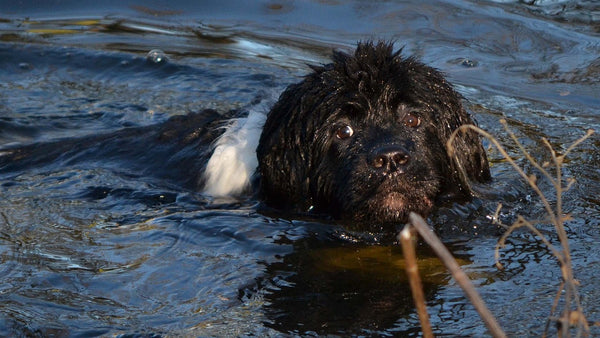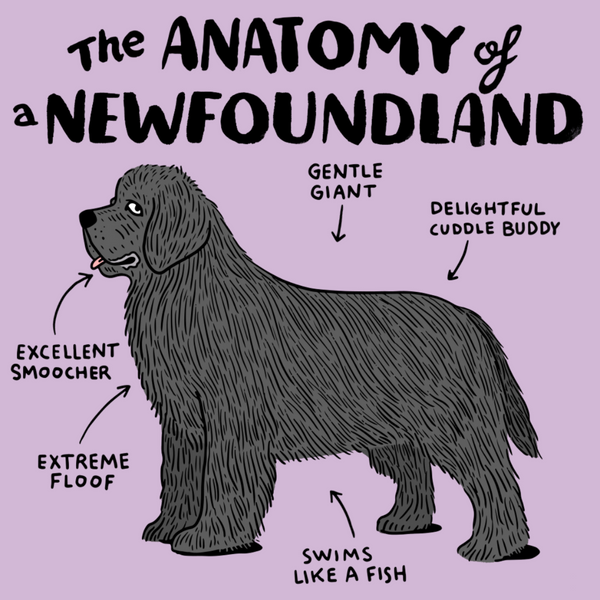Newfoundland Dog Breed Guide
With a whole day dedicated just to them coming up soon, today we're diving into the world of one of the most magnificent dog breeds out there: the Newfoundland. These gentle giants are truly a sight to behold, and if you're considering adding one to your family, you're in for a real treat! Sit back, relax, and let's explore everything you need to know about Newfoundland dogs.
Newfoundland Dog Basics
Average Lifespan: 8-10 years
Average Weight: 46 - 68kg
Coat Length: Long and course
Colouring: Black, brown, gray, and Landseer
Shedding: Moderate, with two moults per year
The Newfoundland: A Brief History
First things first, let's get to know where these majestic pups come from. Hailing from the rugged island of Newfoundland in Canada (hence the name!), these dogs were originally bred to work alongside fishermen. With their webbed feet and impressive swimming abilities, Newfoundlands were invaluable helpers in hauling fishing nets and rescuing people from the icy waters. Their immensely thick coat also acts as a natural buoyancy aid, trapping water and helping them stay afloat.

Characteristics of the Newfoundland Breed
When it comes to size, Newfoundlands don't do anything by halves. These gentle giants can weigh anywhere between 45kg to 68 kg, with males typically being larger than females. Despite their imposing stature, Newfoundland dogs are known for their sweet and gentle nature. They're often referred to as "gentle giants" for a reason – their temperament is as big as their size!
Their thick, water-resistant double coat is another distinguishing feature. It comes in various colors, including black, brown, gray, and Landseer (black and white). Regular grooming is essential to keep their coats in top condition, but with those soulful eyes and wagging tails, who wouldn't want to spend some quality grooming time with these beautiful pups?
Here's one we made earlier...

Living with a Newfoundland: What to Expect
Newfoundland dogs are known for their loving and loyal nature, making them fantastic family pets. However, it's important to understand that their large size requires ample space to roam and stretch those hefty limbs. A spacious backyard or regular trips to the park are a must to keep your Newfoundland happy and healthy.
Despite their love for the great outdoors, Newfoundlands are notorious couch potatoes at heart. Don't be surprised if your gentle giant prefers snoozing on the sofa rather than chasing after a ball – they're masters of relaxation!
Training and Socialization
Like all dogs, Newfoundlands benefit from early socialization and consistent training. Their intelligence and eagerness to please make them quick learners, but they do have a stubborn streak at times. Positive reinforcement techniques, such as treats and praise, work wonders with these gentle giants.
Due to their protective nature, Newfoundlands make excellent watchdogs, but their friendly demeanor means they're more likely to greet intruders with a wagging tail than a bark. Early socialization helps to ensure they're well-adjusted and friendly with both humans and other animals.
Health Considerations
While Newfoundlands are generally healthy dogs, they are prone to certain health issues common in large breeds. These may include hip dysplasia, heart problems, and conditions affecting their joints. Regular veterinary check-ups and a nutritious diet are essential for maintaining your Newfoundland's health and wellbeing.
Fun Facts about Newfoundlands
- Water Rescue Champions: Newfoundlands have a natural affinity for water and are renowned for their lifesaving abilities. In fact, they've been credited with saving countless lives throughout history.
- Famous Faces: Newfoundlands have made their mark in popular culture, appearing in films such as "Peter Pan" and "The Little Mermaid." They've also earned the title of "honorary mascots" for various military units and organizations.
- Gentle Giants: Despite their impressive size, Newfoundlands are known for their gentle and nurturing nature, especially towards children. They're often referred to as "nanny dogs" due to their protective instincts around little ones.
- They're called Newfies darling: If you really want to be in the Newfoundland gang, you'd better start calling them Newfies.
Is a Newfoundland Right for You?
So, is a Newfoundland the perfect pooch for your family? If you're looking for a loving, loyal, and gentle companion who thrives on companionship and cuddles, then the answer is a resounding yes! Just be prepared for a whole lot of slobber and a whole lot of love.
Whilst you're here, why not read:









